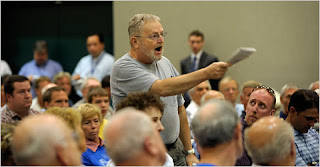 This weekend I saturated myself listening to eulogies and tributes to Senator Ted Kennedy. As I was driving to take the dogs on a short hike, I heard over and over again about his graciousness, kindness, and ability to treat each human he encountered with dignity. My bubble full of hope in mankind was burst the minute I stopped my car.
This weekend I saturated myself listening to eulogies and tributes to Senator Ted Kennedy. As I was driving to take the dogs on a short hike, I heard over and over again about his graciousness, kindness, and ability to treat each human he encountered with dignity. My bubble full of hope in mankind was burst the minute I stopped my car.I got to the trail head, opened my car door, and within seconds, a man said to me: you can't take dogs into the wilderness. First, the generic statement isn't true. But second, there were several recreational opportunities available from where I parked. Somehow, for some reason, this man decided to pounce before he even knew what I was going to do. And last, as a believer that wilderness is a state of mind, an artificial boundary, an anthropomorphic designation of a geographic area, I have a hard time with equally artificial rules. Somehow, a lot of white guys decided these areas are "wild" and "need protecting." That these areas were "untrammeled" by man. Never mind we are essentially colonizing these areas, but that is a whole other discussion. What unnerved me was this presumption to tell me "the rules."
I guess I tend to think of wilderness as a resource, just as water, trees, wildlife. It's boundaries are irrelevant. There is no special "ecology" within the wilderness boundary. It is not any more fragile than other areas.
The rules about dogs or cell phones or helicopters or horses (ironically, horses are allowed on these trails but not dogs or even more ironic are the complex electronics many of these guys now take in lieu of topo maps) are justified as protecting fragile systems, when really they are about protecting some white guy's idea of what a back pack trip should be about.
We have gone a long long way from when wilderness was about wandering, with or without dogs, friends, or GPS systems. Now we are all about rules.
What many of these guys don't understand is that a lot of people are more scared of them then they are the wildlife and adventures they will encounter in the wilderness. Hence, a perfect reason to take a dog along!






















